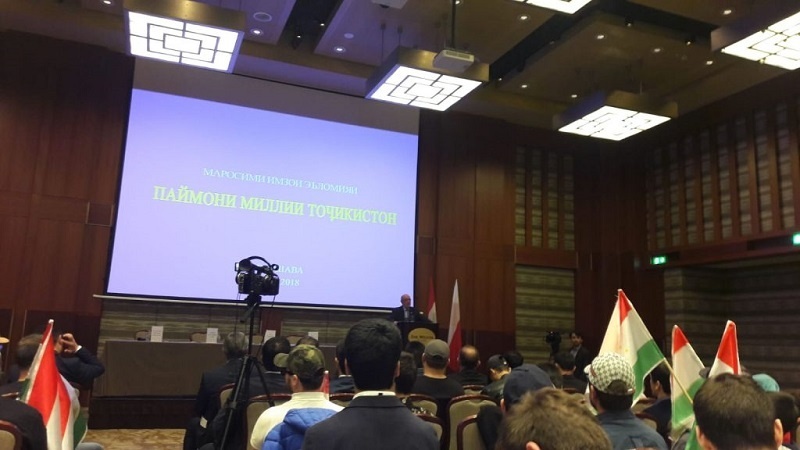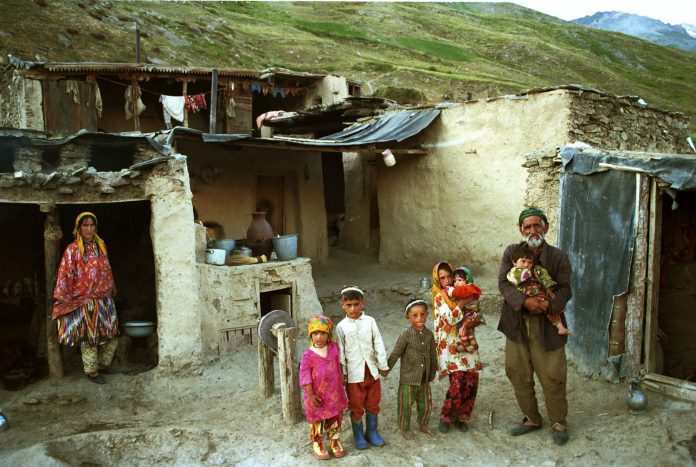«The processes related to the implementation of Rogun Dam project have shown that Tajikistan can progressively plan and implement its long-term development programme. This discourse depends, first of all, on the political will and, secondly, on the citizens’ understanding of the project significance, i.e. social basis,» – political analyst Sherali Rizoyon wrote in his article for the analytical platform cabar.asia.
«Although the definitions of “traditional” and “tolerant” do not quite correctly apply to religion and its various movements, for the past two decades, they have often appeared in official political rhetoric and informational space», notes an expert on religion, Rustam Azizi in his original article for the analytical platform cabar.asia.
«The majority of researches on Chinese topics focus on studying the exceptionally positive aspects of cooperation with China. At the same time, any attempts at a more or less critical consideration of various aspects of Chinese expansion in Tajikistan are characterized in the spirit of Soviet times – as “intrigues of external enemies” or “geopolitical competitors” of China», – states Parviz Mullojanov, the political scientist from Dushanbe, in his article written specifically for the analytical platform cabar.asia.
December – time to sum up the year’s results. By the end of 2018, in addition to journalistic materials, several dozens of analytical articles were published on the cabar.asia portal. We hope that they have revealed actual issues and questions of the Central Asian region, gave a look at some things from other angles, broadened the horizons, and simply helped to spend time with benefit. If you missed something worthwhile, we present you a review of the eight best analytical articles of 2018.
«The results of the October 2018 governmental special operation against crime figures in Gorno-Badakhshan Autonomous Region are evaluated positively. However, the local population voices the grievance over the frequent deployment of military in the region. Meanwhile, there is no confrontation between the center and Khorog on the level of government institutions,” – highlights political scientist Mouslimbek Buriev in original cabar.asia article.
Muslimbek Buriev – participant of cabar.asia School of Analytics
“In recent years, Tajik opposition activities abroad tend to intensify. This became especially visible after a substantial part of fault-finding politicians emigrated to Europe. In their activities, these groups have very limited means for achieving goals,” political analyst Khursand Khurramov notes in his article written for cabar.asia analytical portal.
Follow us on LinkedIn!
Article Overview:
- Tajik opposition reunites. This is the second consolidation after the end of the civil war;
- Today, the political potential of the Tajik opposition alliance is limited to social networks and virtual space;
- The list of priority requirements of the National Alliance includes the protection of human rights, restoration of rights and freedoms for all political forces, as well as ensuring free elections in Tajikistan.

Opposition figures in Tajikistan attempted to unite for the second time after the end of the civil war to achieve political goals. Despite this event was held outside the country, the mere fact of the unification of certain opposition groups actualizes the issue of necessity to study its activities, motives and political perspectives.
In early September 2018, on the eve of the 27th anniversary of the independence of Tajikistan, four Tajik opposition groups announced their unification in the capital of Poland: “National Alliance” (including the banned Islamic Renaissance Party of Tajikistan (IRP), “Movement for Reforms and Progress”, “Forum of Free-Thinking Citizens of Tajikistan” and “Association of Central Asian Migrants in Europe”.

Since the acquisition of independence, the relationships between the opposition and the authorities of Tajikistan remain very complex and controversial. The process – from armed confrontation for power (1992-1997) to signing a peace agreement (1997) and giving the opposition 30% of seats in the government, and then gradual displacement opposition groups from the political field, up to recognition of the main opposition party (IRPT) as terrorist in 2015 – very vividly illustrates this struggle done by the principle of “the winner takes it all”.
[quote]This confrontation over the past period is very different by its methods and the lack of adequate programs and strategies from what the classical political theory suggests. External observers saw this confrontation as the struggle of Islamism and secularism, while the internal observers considered it to be the rivalry of regional groups for access to power and resources. In reality, this was both with the ideologies of secularism and Islamism being aimed at internal legitimization of power and at attracting external sponsors.[/quote]The political landscape of Tajikistan has always been very heterogeneous due to the presence of regional differences in it. Therefore, after the collapse of communism and proclamation of the pluralism principle, the political forces had to combine their efforts across groups in order to consider mutual interests and attract supporters. Based on these principles, the Islamists and Democrats united during the first presidential elections in 1991, the United Tajik Opposition was created during the civil war, as well as Tajikistan Reform Forces Association was created during presidential elections of 2013. In all of these associations, the Islamic Renaissance Party (banned in Tajikistan) played a key role, since it had large-scale support due to the Islamic ideology and significant resources gathered also via external funding. In addition, all these efforts were accompanied by attempts to ensure representation of regional groups in these associations.
Apparently, over time, the main triggers of the Tajik opposition politics remained unchanged. When creating the new “National Alliance”, the Tajik opposition leaders abroad tried to ensure the regional balance as much as possible, and all of this happens again with the active support of the IRPT (banned in Tajikistan). The declaration of the new coalition creation was signed by Alim Sherzamonov, a native of GBAO, Sharofiddin Gadoev, a native of the Khatlon region, Mukhiddin Kabiri, Chairman of the IRP, and Ilhomjon Yakubzoda, a native of the Sughd region (northern Tajikistan).
It seems that this approach aims to achieve at least the following goals:
- demonstration of protest potential of all regions of the country to Dushanbe and external observers;
- regional formation of the groups of solidarity to the creators of the alliance;
- establishing cooperation with countries that are wary of IRPT after its official ban;
- minimization of the Islamic factor through participation of the maximum number of secular figures in the union
The last issue is particularly sensitive for the IRP management, since this party has accessed a relatively large audience due to religious ideology over the past years. At the same time, there is an understanding of “contempt” for political Islam, both from secular citizens of Tajikistan and from international (US, Russia and China) and regional (Uzbekistan, Kazakhstan) actors.
Time will show whether Kabiri will be able to reverse the direction of the party to secularity. However, now he now emphasizes in his statements an exclusively secular future for Tajikistan.
It should also be noted that the recently created alliance does not include all existing opposition groups outside Tajikistan. “Group 24” and the Congress of Constructive Force abstained from joining the coalition, thereby protesting against the presiding IRP.
The head of the Congress and the leader of the political movement “Vatandor” declared an information war to the IRP, noting that the current party leadership by Muhiddin Kabiri is “ineffective and incapable of successful political management.”
Existing Potential
As for the possibilities of opposition groups in terms of identifying their supporters, they are almost completely limited. Before the official announcement of IRP as a terrorist group in 2015, its chairman said that the party has up to 42 thousand members. This figure cannot be confirmed now, since the party itself officially announced the cessation of activities on the territory of Tajikistan, and later was completely banned.
[pullquote]Today, the political potential of the Tajik opposition alliance is limited to social networks and virtual space.[/pullquote]The coalition has at its disposal information websites such as Payom, VostokNews, Ozodandeshon, Habarho and some others. The target audience of the opposition, as can be inferred from their rhetoric and speeches, consists mainly of labor migrants in Russia and the unemployed segments of the population dissatisfied with their living conditions in Tajikistan. Human rights, ineffective domestic policies, personnel replacements, foreign and economic policies – these points are the main target of criticism from the united opposition.
Opposition politicians in emigration are actively speaking at the annual OSCE conferences on the human dimension and are trying, to lobby the sanctions list through European institutions; this list consists of officials, who, in their opinion, are involved in human rights violations. In regional history, a similar precedent took place in 2005 after the Andijan events, when the EU imposed sanctions against several officials from Uzbekistan, but these sanctions were temporary. The published sanctions list by international human rights organizations in September 2017 is the result of the opposition activities. This list featured the name of the chairman of the State Committee for National Security of Tajikistan Saymumin Yatimov. He was blamed for the torture of Mahmadali Khait, deputy chairman of the IRPT.
The National Alliance declares the struggle for building a democratic, legal and secular society in Tajikistan, for respecting human rights, restoring rights and freedoms for all political forces, and fight for fair and competitive elections in Tajikistan. The initiators do not speak about the means of achieving their goals, but given the possibilities of the opposition, it seems that this is primarily all about the information struggle and the pressure on the authorities of Tajikistan through various international and European institutions. Time will show whether they will be able to achieve a result and how official Dushanbe will react to their activities.
Authorities’ Reaction

Considering the latest constitutional reform, in particular, the lowering of the age requirement for the presidency and the intensive career promotion of Rustam Emomali, it is obvious that the process of power transition has started in Dushanbe. The success of this transition depends on the stability of the political regime and on favorable external factors. Judging by the positive reviews of the capital residents, Rustam Emomali has almost succeeded in creating the image of an effective manager as mayor of Dushanbe on the domestic political level. This circumstance creates a favorable background for power transition and deprives the opposition of certain advantages. Nevertheless, the existing political regime has a number of problems and unsolved issues, including the problem of human rights inadequate protection, unresolved social and economic problems, high unemployment rate, corruption, increasing national debt, etc. These chronic problems of the country cannot be solved in the short period. Therefore, for an effective power transition, Dushanbe can either use repressive mechanisms, or choose for a certain liberalization, including a dialogue with the opposition. Judging by the latest decisions of the authorities, certain liberal steps to improve the image are already being taken. These could include the release of journalist Khairullo Mirsaidov, lawyer Shukhrat Kudratov, lifting the travel ban on opposition family members, inviting the opposition to the negotiations during the OSCE Human Dimension Conference.
Conclusions
Tajik opposition activity abroad in recent years in fact tends to intensify. This became especially visible after the ban of IRPT and the emigration of a significant number of its members to Europe. Despite this, opposition groups have very limited means for achieving goals, because the absolute majority of Tajikistan citizens do not have access to social networks and new information spaces, and the republic’s authorities can filter the information to some extent.

In addition, any demonstration of a sympathy for these groups is can lead to criminal prosecution, since almost all of them are included in Tajikistan to a list of terrorist and extremist organizations. Nevertheless, the unresolved important socio-economic problems of Tajikistan and reliance solely on repressive methods may attract more attention to the activities of the opposition abroad and contribute to their popularization.
Obviously, despite certain liberal steps were taken, under the existing conditions, the political regime in Dushanbe does not intend to engage in dialogue with the opposition, since their confrontation has become too mutually exclusive. Such a prerogative, perhaps, will be passed on to the next contender for power if the family power transition happens successfully and the opposition is not able to counter it.
This article was prepared as part of the Giving Voice, Driving Change – from the Borderland to the Steppes Project implemented with the financial support of the Foreign Ministry of Norway. The opinion expressed in the article does not reflect the position of the editorial board or the donor.
“Saudi and pro-Salafi lobby are already active in most countries of the region; according to critics, some government decrees and decisions adopted in recent years in the religious sphere look as if they were written at the suggestion of the Salafis, or in close consultation with them”, – an expert from Tajikistan, Parviz Mullojanov, on the geopolitical aspects of Salafization in Central Asia, specially for cabar.asia.
Follow us on LinkedIn!
“A wise, far-sighted, and ‘soft’ Chinese foreign policy has in the past decade not only minimized but also reduced the influence of Russia and others countries in Tajikistan by creating a powerful pro-China lobby to influence policy both within the country and abroad” – expert Michael Petrushkov, writing specially for cabar.asia, gives the orientation of external actors’ foreign policies in Tajikistan.
Follow us on LinkedIn!
“Tajik authorities have gone further with the majority of the country’s Internet providers having blocked a number of VPN proxies and other programs meant to circumvent web filtering.” – expert Nuriddin Karshiboev, writing specially for cabar.asia, assesses the latest developments in Tajikistan’s media sphere.
Follow us on LinkedIn!
“Independent media is increasingly in need of state support in the form of tax breaks and guarantees of protection, but the state continues to simply ignore the condition of the media,” – Political scientist Khursand Khurramov sheds light on the problems facing independent media in Tajikistan in this cabar.asia exclusive.
Follow us on LinkedIn!
